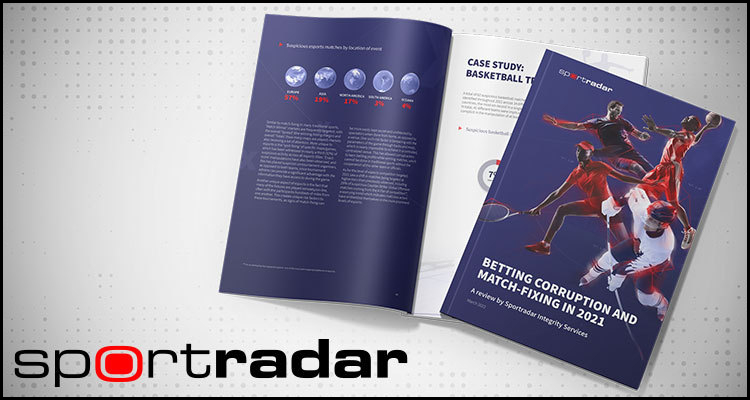
Sports data intelligence specialist Sportradar AG is warning against the dangers of match-fixing after its Sportradar Integrity Services subsidiary last year detected suspicious activities surrounding a record 903 contests.
The Swiss enterprise used an official press release to detail that the concerning figure uncovered by the Universal Fraud Detection System bet monitoring service was the highest in its 17-year history and represented a rise of 2.4% when compared with the 882 dubious transactions uncovered for the whole of 2019.
Lucrative lawlessness:
St Gallen-headquartered Sportradar AG disclosed that the findings of its most recent investigation into suspected instances of match-fixing have been laid out in its new Betting Corruption and Match-Fixing in 2021 report as aggregated global sportsbetting handle for the twelve months hit an estimated €1.45 trillion ($1.61 trillion). The authority also stated that last year’s suspected cheating is thought to have generated in the region of €165 million ($182 million) for illicit syndicates although the true figure could be much higher if ‘other potential financial schemes such as money laundering’ are included.
Powerful penalties:
Andreas Krannich serves as the Managing Director for Sportradar Integrity Services and he used the press release to proclaim that his organization is committed ‘to protecting the integrity of global sport’ and last year cooperated with partners to support 65 sanctions. The analyst divulged that these had been delivered in eleven nations across tennis and soccer while additionally encompassing eight lifetime athlete bans.
Read a statement from Krannich…
“There is no easy short-term solution to the match-fixing issue and we’re likely to see similar numbers of suspicious matches in 2022 if not more. As the market has developed, so the threat of match-fixing has evolved while would-be corruptors are now taking an increasingly direct approach to match-fixing and betting corruption with athletes being messaged directly via social media platforms.”
Football failures:
Sportradar AG noted that its probe found that soccer was the sport most at risk of falling victim to suspected instances of match-fixing last year courtesy of a rate of one in every 201 fixtures in advance of eSports and basketball with associated ratios of 1/384 and 1/498 respectively. The specialist went on to explain that lower-level football competitions had the highest levels of potential cheating with 50% of all cases having involved domestic games from below the second tier including youth and regional action.
Troublesome times:
The Betting Corruption and Match-Fixing in 2021 investigation furthermore laid out the fact that September and October had last year hosted the highest instances of suspected match-fixing at 105 and 104 respectively with these months corresponding with the traditional start to the European soccer season. Finally, the probe uncovered that most alleged cheating at 22.5% had taken place on a Sunday followed by Wednesdays at 16.8% and Saturdays with 15.6%.
The statement from Krannich read…
“At Sportradar AG, we believe in adopting a progressive approach to integrity protection through bet monitoring and intelligence gathering. This has been proven to deliver sanctions against those involved in match-fixing while preventative measures such as educating athletes and stakeholders are also crucially important in the long-term fight against match-fixing.”
Gambling for India refers to the act of participating in various forms of gambling, whether online or offline, within the context of Indian laws, culture, and preferences. Gambling includes activities where individuals wager money or valuables on uncertain outcomes with the intent of winning more money or prizes. In India, gambling encompasses a wide range of activities, from traditional games like Teen Patti and Andar Bahar to modern casino games, sports betting, and online gambling.
Gambling for India is an evolving landscape, where both traditional forms of gambling and modern online gambling are becoming increasingly popular. While the legal environment remains complex, with a mix of state laws and offshore regulations, the gambling market continues to grow, driven by technology, changing cultural attitudes, and the demand for entertainment. Players interested in gambling in India should always ensure they are using reputable platforms and understand the legal and financial implications of their actions.




